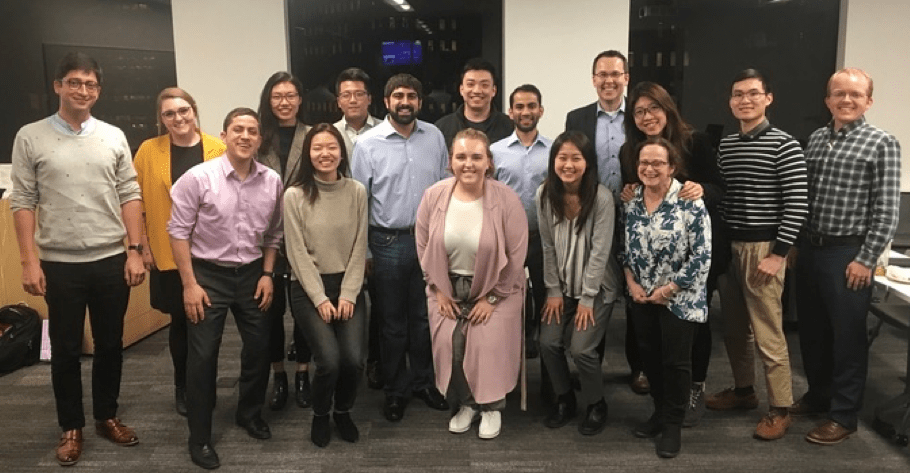By Xiaolei Cheng, Shao-Hsuan Kao, & Kat Klein
Day 3 – Wednesday, March 27: Tarun Wadhwa, Day One Insights
Day three of the EnTP trip concluded with Tarun Wadhwa’s presentation at Northwestern San Francisco. It was a highlight of our trip. As CEO of Day One Insights, an academic, and an acclaimed writer, Tarun illustrated various interdisciplinary technological convergences within the exponentially advancing world of artificial intelligence (AI), gene editing, and many other burgeoning technologies. Tarun displayed a deep understanding of various technologies and a keen observation of related societal challenges.
One key takeaway is how numerous advancing technologies emerged from faster and cheaper computing power at a tremendous rate, reflecting Moore’s Law. Exponentially advancing computing power pushes the development of technology. For example, the convergence among computing, telecommunication, and medical technologies gave birth to remote medical care. With the rise of powerful computing power, deep learning AI, and multi-functional component integration technologies, we will see more unexpected technological convergences in three to five years. Tarun emphasized that these emerging technologies will not only significantly improve human lives but also profoundly change society and challenge our moral and ethical values.
Tarun illustrated many examples of these cutting-edge technologies and discussed their impact. One such example involved healthcare services. With faster analysis of patients’ information, AI not only assists doctors with the implementation of medical tests but also analyzes massive amounts of data and give medical suggestions. In some cases, AI is better and faster than our doctors.
Tarun also described some rapidly developing medical technologies such as bionic enhancements, robotic surgery, and AI mental healthcare chatbots. These are revolutionizing the medical industry. In addition, due to the cost reduction in genetic testing and gene editing, treating cancer may no longer be as difficult a task. AI is also changing the manufacturing field. AI is empowering the development of customization. People can use 3D printing technology to produce customized products with complicated structure and different materials. This fast production of prototypes will lead to quicker innovation.
Even though advancing technologies bring about numerous advantages and new opportunities, Tarun challenged us to consider the moral and ethical issues that come with this innovation. For instance, Tess is an innovative mental health chatbot. What if users disclose information about suicide or injuring others? Should the software inform the police even though it invades the user’s privacy? As a parent, would you use gene editing to enhance the health, or even intelligence, of your child? Would that impact the parent-child relationship? Moreover, what happens to intellectual property when objects can be downloaded and produced via 3D printing technology? As a government regulator, how might you face the problem of 3D printed weapons? Tarun’s questions were very thought-provoking. As MSL students, we focus on the intersection of technology, law, and business, and therefore, we need to be conscious of the societal impact of innovation, and proactively determine ways to build a legal framework for them.
This is the most innovative time in human history. The exponentially advancing world gives individuals powerful tools. Now smaller enterprises can do what only the government and large companies could do before. In Tarun’s inspiring presentation, he encouraged us to be appropriately skeptical of the potentially destructive aspects of innovation but to also embrace the fast change of the world. We are incredibly grateful that Tarun could share his time and wisdom with us.








